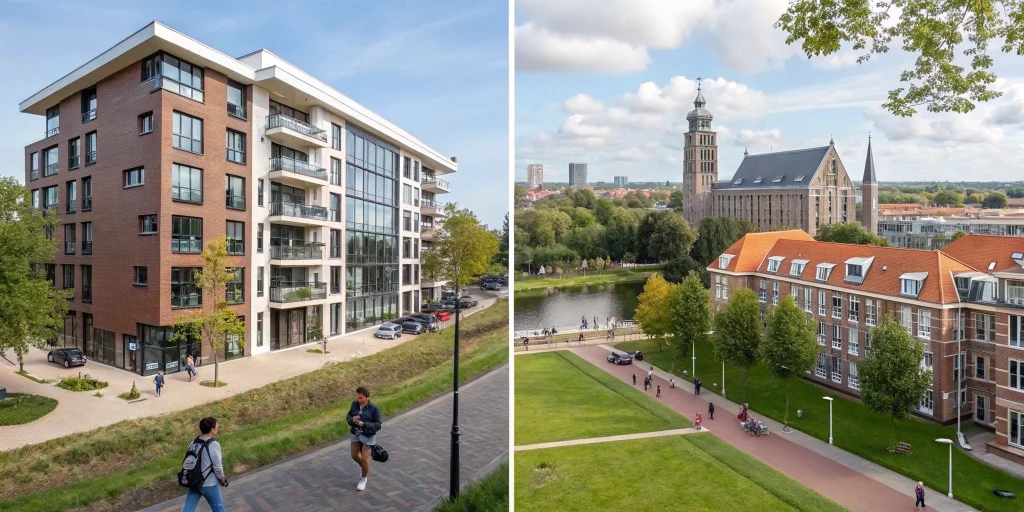Student Accommodation in the Netherlands: Renting vs. On-Campus Housing
On-Campus Housing Options in the Netherlands
Private Rental Market: Flexibility and Independence
Comparing Student Accommodation by City
Key Factors to Consider When Choosing Accommodation
Navigating Timing and Applications in the Dutch Housing Market
How Study in Netherlands Supports Your Student Accommodation Journey
Conclusion
Understanding the Dutch Student Housing Landscape
The Netherlands is currently facing a notable housing shortage, particularly in student-populated cities such as Amsterdam, Rotterdam, and Utrecht. This shortage has led to heightened competition and rising rental prices, making it essential for students to start their accommodation search early. Unlike some countries where universities guarantee housing for all students, Dutch institutions typically offer limited on-campus accommodations, covering only a fraction of the total student population.
For instance, Erasmus University Rotterdam provides housing for approximately 25% of its incoming international students, pushing the majority towards the private rental market. Understanding these market dynamics is vital for recruiters and admissions teams advising prospective students.
On-Campus Housing Options in the Netherlands
University Dormitories: Affordability and Community
University dormitories remain one of the most cost-effective housing options for students:
- Monthly rent: Generally between €250 and €500
- Location: Proximity to university campuses and facilities
- Management: Often administered by student housing organizations connected to universities
- Community: Offers a vibrant social atmosphere ideal for international students seeking connection
Dormitory accommodations typically feature shared kitchens and common areas that encourage social interaction. Many universities collaborate with specialized student housing providers to maintain these facilities, ensuring a secure and supportive environment.
Benefits of On-Campus Housing
- Cost-effective living with controlled rental prices
- Close to academic resources, cutting down commute time
- Built-in social networks, fostering integration and support for newcomers
- Simplified application and contract processes, usually aligned with academic calendars
However, availability is limited and demand often exceeds supply, underscoring the importance of applying early through university housing portals.
Private Rental Market: Flexibility and Independence
With limited on-campus housing, the private rental market plays a major role for international students. This arena includes a variety of options catering to different budgets and lifestyles.
Shared Apartments
- Rent: Typically €400 to €700 per month
- Features: Often larger living spaces with shared expenses among roommates
- Considerations: Requires compatible roommates and more proactive searching
Private Studios
- Rent: Between €700 and €1,200 monthly
- Privacy: Offers a dedicated personal space with self-contained facilities
- Furnishing: Usually comes fully furnished, easing the transition process
Purpose-Built Student Accommodations (PBSAs)
PBSAs are modern, privately managed residences designed specifically for students. Their advantages include:
- Fully furnished rooms equipped with modern amenities
- Strategic locations near major universities
- Organized social and community events
These accommodations combine the reliability of university housing with the luxury and convenience of private rentals but at a premium price point.
Comparing Student Accommodation by City
| City | Housing Availability | Average Monthly Cost | Competition Level |
|---|---|---|---|
| Amsterdam | Very Limited | Highest (€700–€1,200) | Very High |
| Rotterdam | Moderate | High (€500–€900) | High |
| Utrecht | Limited | High (€600–€1,000) | High |
| Eindhoven | More Available | Moderate (€450–€700) | Moderate |
Advisors should tailor guidance based on the student’s intended city, helping them manage expectations and strategize housing applications accordingly.
Key Factors to Consider When Choosing Accommodation
International students must balance several factors to choose suitable housing:
- Budget Constraints: University dorms offer the least expensive options, while private studios represent the higher end of the price spectrum.
- Social Preferences: On-campus housing encourages social engagement, whereas private rentals provide independence and privacy.
- Location: Prioritize proximity to the university, public transit, and essential services.
- Duration and Contract Flexibility: University accommodations usually align with academic programs. Private rentals may require longer leases and deposits.
Understanding these priorities helps recruiters and admissions professionals offer personalized, practical advice.
Navigating Timing and Applications in the Dutch Housing Market
Timing is an essential component of success in securing student housing:
- Start early: Begin the search at least 3–4 months before planned arrival.
- Meet deadlines: University housing applications have specific cut-off dates; missing these can limit options.
- Private market timing: Rentals often become available only 1–2 months before move-in dates, requiring vigilant monitoring.
- Confirm arrangements: Secure contracts prior to arrival to avoid last-minute housing crises.
Educational agencies and university admissions teams can play a pivotal role by guiding students through this timeline efficiently.
How Study in Netherlands Supports Your Student Accommodation Journey
At Study in Netherlands, we understand the complexities international students face when arranging accommodation. Our platform is uniquely positioned to assist university admissions teams, recruiters, and education professionals in:
- Providing accurate, up-to-date housing information tailored to demand and city-specific trends.
- Connecting students with verified housing providers, both on-campus and in the private sector.
- Advising on housing contracts, budgeting, and legal considerations to ensure secure agreements.
By leveraging our expertise, education institutions and recruitment agencies can streamline housing support services, enhancing the overall student experience in the Netherlands.
Conclusion
Deciding between renting privately and living in on-campus housing in the Netherlands hinges on multiple considerations including budget, social preferences, location, and availability. While university dormitories offer affordability and convenience, private rentals provide greater privacy and choice—albeit at higher costs.
Given the current housing crisis and market competitiveness in major Dutch cities, it is crucial for international students to begin their search well ahead of arrival and to be guided by reliable, professional advice.
Study in Netherlands is your trusted partner in navigating this complex decision-making landscape. Our comprehensive services help education professionals and recruiters deliver seamless accommodation support, enabling international students to embark on their academic journey confidently and comfortably.
Take the Next Step with Study in Netherlands
Explore further and discover how we can help you find the ideal student accommodation.

